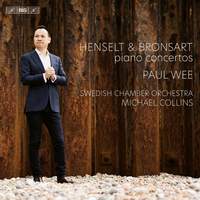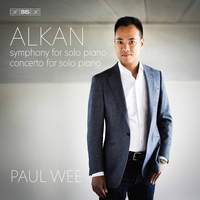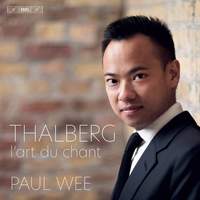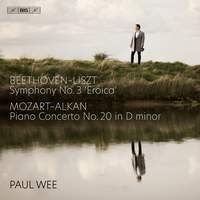Interview,
Paul Wee on his dual career
Ahead of his Wigmore Hall debut with Alkan's solo concerto this Saturday, I visited Paul on 'home' territory at Gray's Inn to find out more about the common ground between the two sides of his professional life, why Alkan's music has exerted such a particular fascination over him since his teens, the joys of making music with friends and colleagues, and the two bona fide concertos by neglected composers on his most recent recording...
How on earth do you manage to sustain two such intense careers in parallel?
It’s a demanding balance, certainly. When it comes to it I am a barrister by day, but I love the piano and I love music: it’s something I’ve always naturally gravitated towards, and somehow I manage to make it all work. It’s one thing when I’m just playing for fun but getting ready for a recording-session or a recital is a much more serious commitment, and when those come into the mix it’s just a matter of time-management: figuring out what you need to do and when you need to be ready by. And those happen to be the sorts of things I have to do anyway in my day-job…
Are there other transferrable skills which come into play?
Absolutely. Whether you’re talking about a performance or a case, there’s a lot of preparation involved: you spend days making sure that you know your material, that you have a clear sense of what case you’re constructing or what interpretation you’re making from it. Then when it comes to it, you have to deliver on the day. And in both scenarios you never know exactly what’s going to happen...on the concert-platform you’re dealing with the excitement of live performance, and in court you can’t always predict how the witness is going respond to your cross-examination or what questions you’ll be asked by the judge. So in both professions there comes a point when you have to rely on your preparation and wing it.
I gather that the piano you're sitting at right now has been in your life for quite some time...?
That’s right! I fell on my feet without realising it when I enrolled at Gray’s Inn in London. Gray’s is the smallest of the Inns of Court but I’d been told it was a wonderfully supportive community, and when I came along I introduced myself to various people. When they heard I played the piano they invited me to give some concerts at the Inn, and I couldn’t believe my luck. At that time I was living in a tiny flat in Farringdon with no room for a real piano: I just had a little digital instrument at home, and once the Inn realised that I was a decent pianist who was keen to play for them they kindly said that I could use the piano in Hall whenever I wanted. That was a life-saver in my first years back in London after university, and I’ve been hugely grateful to them ever since.
Do you also find that a lot of the work can actually be done away from the keyboard?
Absolutely. It’s not just about ensuring that you know the music from the inside out (although that’s obviously hugely important in this sort of repertoire): I think there’s a lot that can be done away from the instrument even when it comes to sorting out tricky technical problems. I’m absolutely not the sort of pianist who spends hours sitting at a keyboard. Often solutions to the passages that I’ve been grappling with will just come to me when I’m not doing anything at all, and it’s exactly the same in the day job: you wrestle with a case for days, thinking about what exactly you're trying to say and the right way to frame the argument, then the answer will pop into your head later when you're doing something completely unrelated. It’s the way we work!

You mentioned the distinction between playing for pleasure and juggling recording-sessions and professional recitals - at what stage did that transition happen for you?
It was a very sudden thing, almost overnight really, and there was a lot of serendipity involved. It was something I had never set out to make happen, and again the story started here at Gray’s Inn. I had given a summer concert at the Inn in 2015, playing the Alkan Concerto for Solo piano, because I just thought ‘Why not? I’ve got a place to perform this beast and a lovely audience who’ll come along and enjoy it’. Some members of the Alkan Society came along, and a few months down the line they asked me if I would come and play the piece again for one of their recitals. Of course I said yes – having wrestled with the thing once, I thought it would be quite nice to perform it a second time!
That happened in 2016, and it just so happened that the well-known critic and piano-writer Bryce Morrison was in the audience; he came up to me afterwards and insisted I had to do something about it and I said ‘Well, I’d love to, but what do I do?!’. From there Bryce introduced me to fellow pianophile Mike Spring (formerly of Hyperion Records), who helped me to put a recording together. We sent it out to Robert von Bahr at BIS, whom we knew listens to everything that he’s sent; Robert loved it, and so it was released into the big wide world.
Alkan's piano music has a reputation for being formidably demanding: was that part of the appeal for you?
I think it’s fair to say that that was part of the original attraction. When I was a teenager discovering the piano literature, I would read about these peaks of the repertoire which very few people had scaled and which were mentioned in very hushed tones, so of course that sparked curiosity to find out more about them. I first became aware of Alkan when I’d just started going to the Manhattan School of Music’s pre-college division on Saturdays, which meant I had access to their library so I’d go and leaf through the scores and find recordings.
Of course this was in the days before Spotify, YouTube and IMSLP when it was otherwise a huge chore to access a lot of this music, but hearing the Solo Concerto for the first time (through Marc-André Hamelin’s incredible recording) was one of those ear-popping experiences you never forget. Some friends had told me it was an astonishing piece, but nothing that they said could have prepared me for what I heard. It’s an overwhelming fifty minutes in terms of its scale, its pianism, its excitement and its poetry - and of course I never forgot the impact that Marc-André’s artistry had on me either.
Am I right in thinking that your new album is your first commercial recording of a concerto in the traditional sense of the word?
Yes, this is my first ensemble recording of any kind; on this album we have two composers who left behind single piano concertos, and they make a wonderful pairing. Adolf von Henselt was one of the legendary composer-pianists of the nineteenth century; if you read accounts from critics at the time, people would speak of him in the same breath and sentence as Chopin, Liszt, Thalberg and Alkan. They all came along in the same five-year period – there must have been something in the water!
Henselt made his name with some of his very early compositions: he wrote two books of études which were wonderfully received, so much so that when he went to Russia he was appointed court pianist and given enormous responsibilities in the development of what became the Russian Piano School. But his music was regarded very highly elsewhere, too – there’s a fabulous account of Liszt talking about him and showing the esteem in which he held his music.
The one work of his which people played all the way through the nineteenth century (and indeed into the beginning of the twentieth) was his piano concerto, which was a real monument of the literature of the time. It was premiered by Clara Schumann under the baton of Felix Mendelssohn, and was regarded as very serious, high-quality music - because it is! It was one of the big Romantic piano concerto war-horses of the time, although that didn’t last for various reasons…its place in the repertoire was probably taken by Tchaikovsky’s Piano Concerto No. 1 and Rachmaninoff’s Piano Concerto No. 2. Henselt is a legendary name to many pianists and piano aficionados, predominantly through the legacy of this concerto, but there are other fabulous works by him too.
Hans von Bronsart is perhaps a less familiar name. He’s most remembered these days for having been a student of Liszt, who dedicated the Piano Concerto No. 2 to him and conducted the premiere with Bronsart as soloist. As a composer and as a pianist Bronsart didn’t have the same sort of legacy as Henselt, but what he did leave behind was this fantastic piano concerto…
Speaking of ensemble projects, is there much time in your hectic life for chamber music?
I used to play much more than I do now, before COVID in particular. There was a chamber music group that I played with quite regularly, made up of lawyers and people connected to lawyers. Our first violinist was another barrister at Gray’s Inn who used to be a professional violinist and played concerts with the Academy of St Martin in the Fields and the London Symphony Orchestra. Our second violinist was his wife, a doctor; our violist was a Supreme Court judge, and our cellist was a circuit judge.
We’d get together every month or six weeks; one of us would host and we’d decide in advance that we’d play the Schumann Piano Quintet or the Brahms Piano Quintet, or perhaps a piano trio if only a few of us were available. It was the purest music-making for the sheer fun of it, and that was so refreshing: you get to enjoy all these works from the inside-out, but without anybody caring if you miss that run here or splash that chord there. It was absolutely joyous and I wish I did more of that now, but with two little children it’s no longer so easy to escape in the evenings!
You’ll make your Wigmore Hall debut with the Alkan Solo Concerto on Saturday – how are you feeling about it, and what makes the Hall such a special place for you?
It’s probably the concert-venue I go to the most: I’m in love with the sound you get in those seats, and to me it’s the most treasured venue in the world because of the memories that I’ve made there from being an audience-member. I think their programming is constantly new and exciting and daring, and I’m a huge fan of and believer in John Gilhooly. All of that makes it doubly surreal for me to think that instead of sitting in the audience on Saturday I’m going to experience it (and hopefully enjoy it) from the other side!
Paul Wee (piano), Swedish Chamber Orchestra, Michael Collins
Available Formats: SACD, MP3, FLAC, Hi-Res FLAC, Hi-Res+ FLAC
Paul Wee (piano)
Available Formats: SACD, MP3, FLAC, Hi-Res FLAC, Hi-Res+ FLAC
Paul Wee (piano)
Available Formats: 2 SACDs, MP3, FLAC, Hi-Res FLAC, Hi-Res+ FLAC
Paul Wee (piano)
Available Formats: SACD, MP3, FLAC, Hi-Res FLAC, Hi-Res+ FLAC







